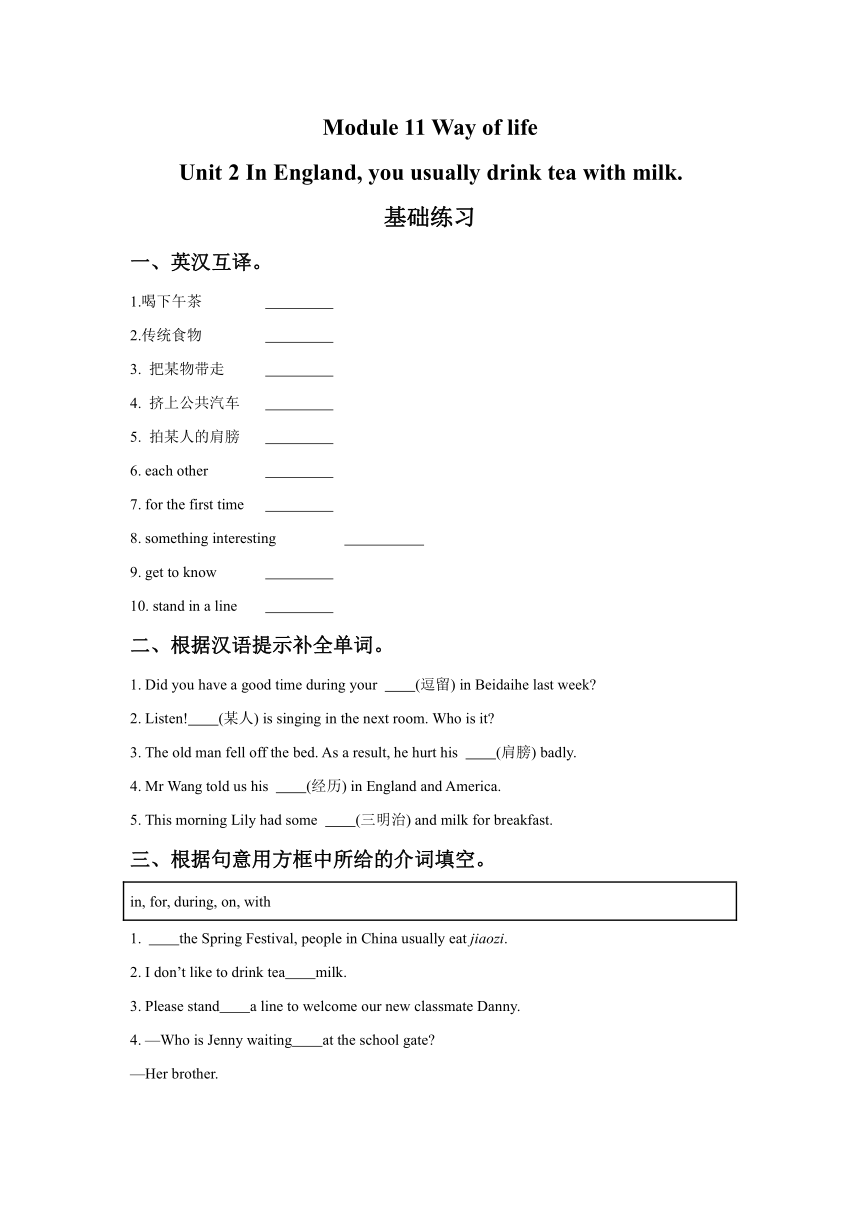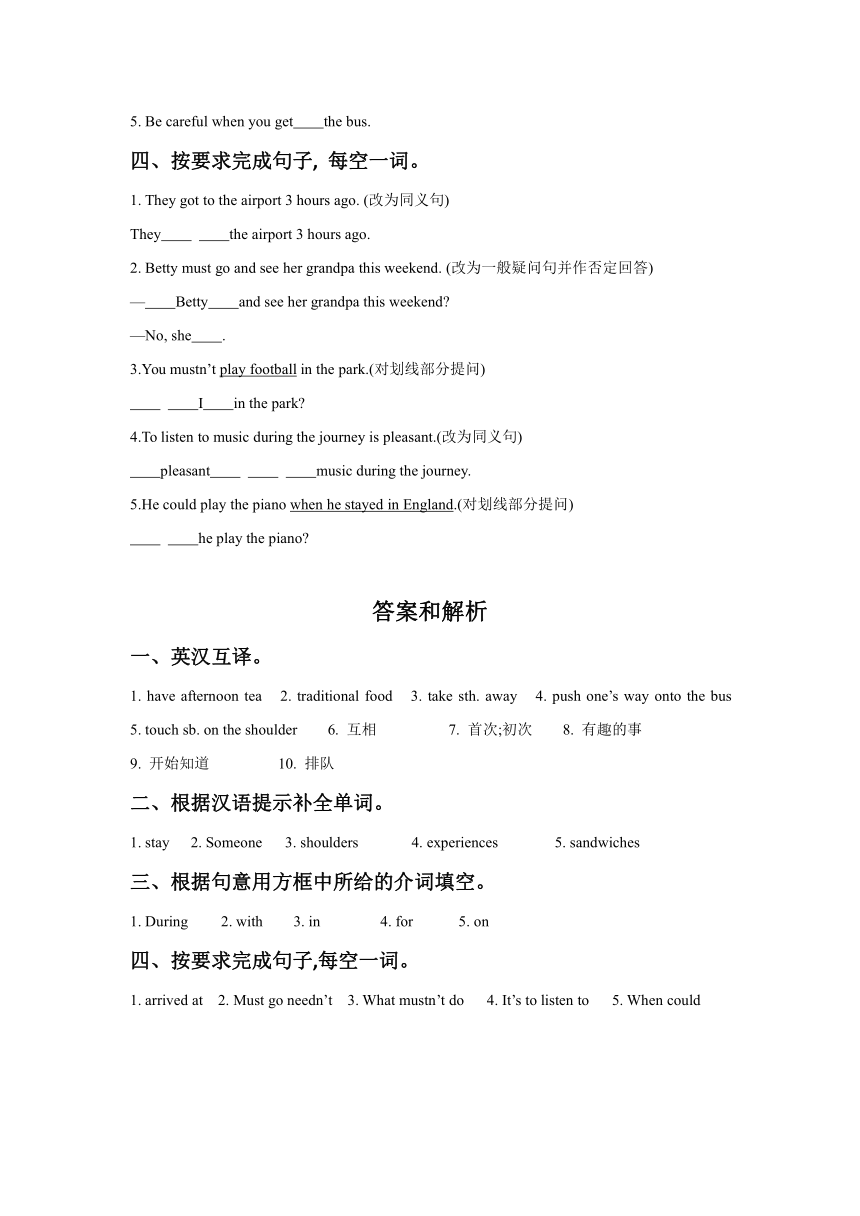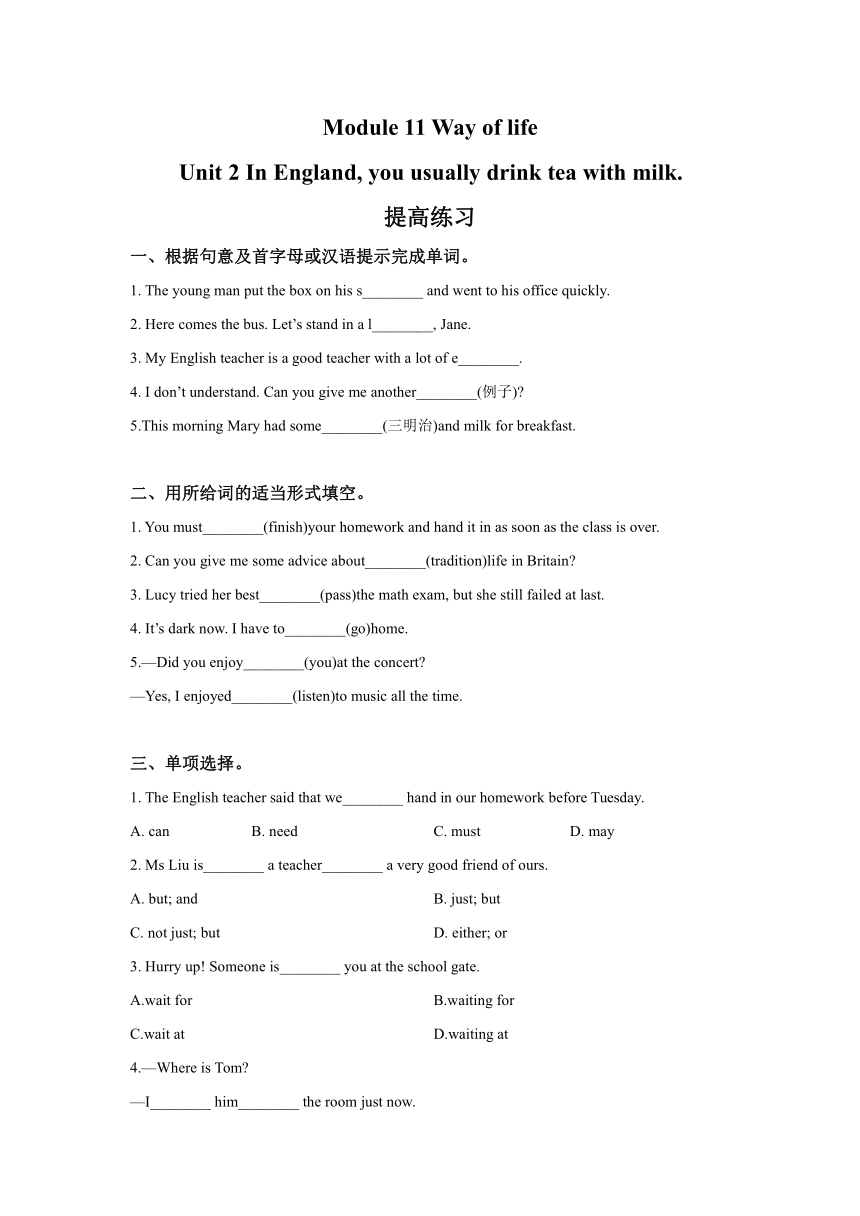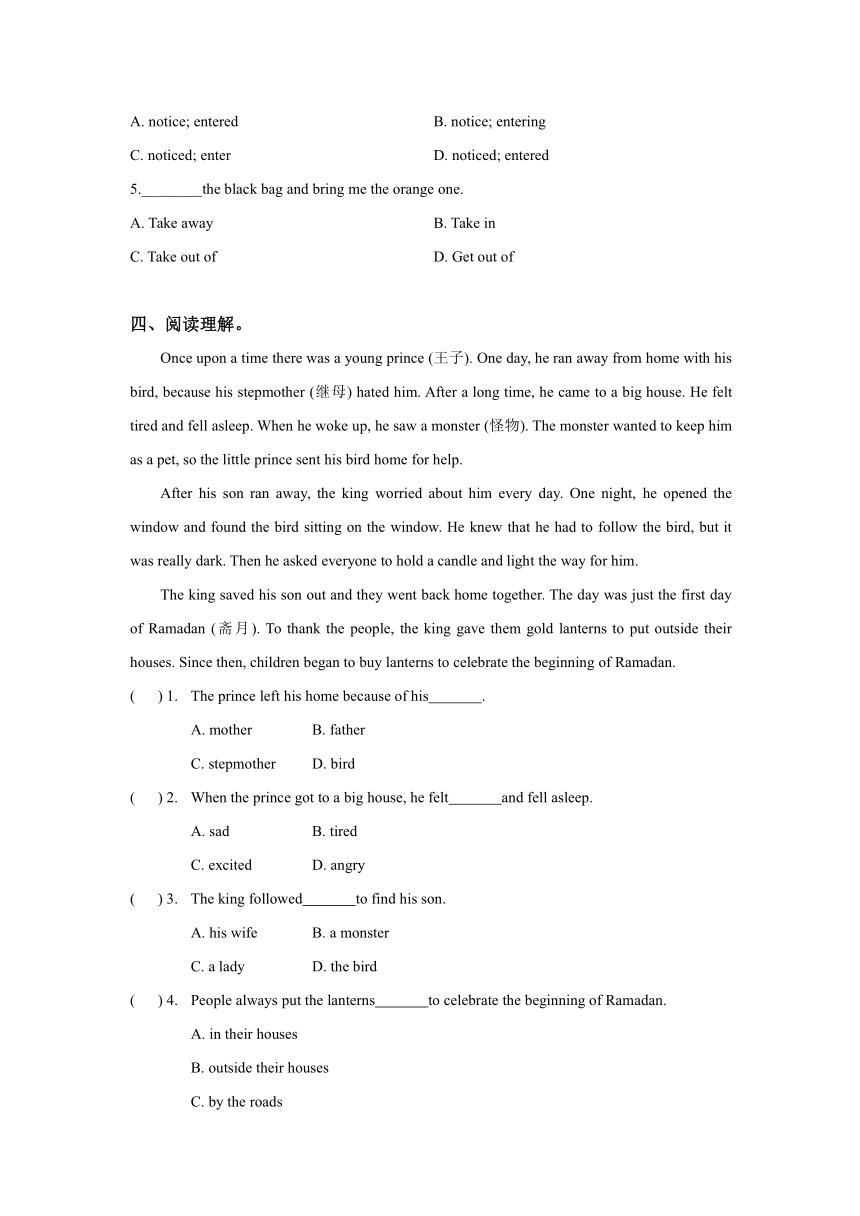Module 11 Way of life Unit 2 In England, you usually drink tea with milk 同步练习(含答案)
文档属性
| 名称 | Module 11 Way of life Unit 2 In England, you usually drink tea with milk 同步练习(含答案) |

|
|
| 格式 | zip | ||
| 文件大小 | 15.9KB | ||
| 资源类型 | 教案 | ||
| 版本资源 | 外研版 | ||
| 科目 | 英语 | ||
| 更新时间 | 2019-07-14 00:00:00 | ||
图片预览




文档简介
Module 11 Way of life
Unit 2 In England, you usually drink tea with milk.
基础练习
一、英汉互译。
1.喝下午茶 ??
2.传统食物 ??
3. 把某物带走 ? ?
4. 挤上公共汽车 ? ?
5. 拍某人的肩膀 ? ?
6. each other ? ?
7. for the first time ? ?
8. something interesting ?
9. get to know ? ?
10. stand in a line ? ?
二、根据汉语提示补全单词。
1. Did you have a good time during your (逗留) in Beidaihe last week??
2. Listen! (某人) is singing in the next room. Who is it??
3. The old man fell off the bed. As a result, he hurt his (肩膀) badly. ?
4. Mr Wang told us his (经历) in England and America. ?
5. This morning Lily had some (三明治) and milk for breakfast. ?
三、根据句意用方框中所给的介词填空。
in, for, during, on, with
1. the Spring Festival, people in China usually eat jiaozi. ?
2. I don’t like to drink tea milk. ?
3. Please stand a line to welcome our new classmate Danny. ?
4. —Who is Jenny waiting at the school gate??
—Her brother.
5. Be careful when you get the bus. ?
四、按要求完成句子, 每空一词。
1. They got to the airport 3 hours ago. (改为同义句)
They the airport 3 hours ago. ?
2. Betty must go and see her grandpa this weekend. (改为一般疑问句并作否定回答)
— Betty and see her grandpa this weekend??
—No, she . ?
3.You mustn’t play football in the park.(对划线部分提问)?
I in the park??
4.To listen to music during the journey is pleasant.(改为同义句)
pleasant music during the journey.?
5.He could play the piano when he stayed in England.(对划线部分提问)?
he play the piano??
答案和解析
一、英汉互译。
1. have afternoon tea 2. traditional food 3. take sth. away 4. push one’s way onto the bus 5. touch sb. on the shoulder 6. 互相 7. 首次;初次 8. 有趣的事
9. 开始知道 10. 排队
二、根据汉语提示补全单词。
1. stay 2. Someone 3. shoulders 4. experiences 5. sandwiches
三、根据句意用方框中所给的介词填空。
1. During 2. with 3. in 4. for 5. on
四、按要求完成句子,每空一词。
1. arrived at 2. Must go needn’t 3. What mustn’t do 4. It’s to listen to 5. When could
Module 11 Way of life
Unit 2 In England, you usually drink tea with milk.
提高练习
一、根据句意及首字母或汉语提示完成单词。
1. The young man put the box on his s________ and went to his office quickly.
2. Here comes the bus. Let’s stand in a l________, Jane.
3. My English teacher is a good teacher with a lot of e________.
4. I don’t understand. Can you give me another________(例子)?
5.This morning Mary had some________(三明治)and milk for breakfast.
二、用所给词的适当形式填空。
1. You must________(finish)your homework and hand it in as soon as the class is over.
2. Can you give me some advice about________(tradition)life in Britain?
3. Lucy tried her best________(pass)the math exam, but she still failed at last.
4. It’s dark now. I have to________(go)home.
5.—Did you enjoy________(you)at the concert?
—Yes, I enjoyed________(listen)to music all the time.
三、单项选择。
1. The English teacher said that we________ hand in our homework before Tuesday.
A. can B. need C. must D. may
2. Ms Liu is________ a teacher________ a very good friend of ours.
A. but; and B. just; but
C. not just; but D. either; or
3. Hurry up! Someone is________ you at the school gate.
A.wait for B.waiting for
C.wait at D.waiting at
4.—Where is Tom?
—I________ him________ the room just now.
A. notice; entered B. notice; entering
C. noticed; enter D. noticed; entered
5.________the black bag and bring me the orange one.
A. Take away B. Take in
C. Take out of D. Get out of
四、阅读理解。
Once upon a time there was a young prince (王子). One day, he ran away from home with his bird, because his stepmother (继母) hated him. After a long time, he came to a big house. He felt tired and fell asleep. When he woke up, he saw a monster (怪物). The monster wanted to keep him as a pet, so the little prince sent his bird home for help.
After his son ran away, the king worried about him every day. One night, he opened the window and found the bird sitting on the window. He knew that he had to follow the bird, but it was really dark. Then he asked everyone to hold a candle and light the way for him.
The king saved his son out and they went back home together. The day was just the first day of Ramadan (斋月). To thank the people, the king gave them gold lanterns to put outside their houses. Since then, children began to buy lanterns to celebrate the beginning of Ramadan.
( ) 1. The prince left his home because of his .
A. mother B. father
C. stepmother D. bird
( ) 2. When the prince got to a big house, he felt and fell asleep.
A. sad B. tired
C. excited D. angry
( ) 3. The king followed to find his son.
A. his wife B. a monster
C. a lady D. the bird
( ) 4. People always put the lanterns to celebrate the beginning of Ramadan.
A. in their houses
B. outside their houses
C. by the roads
D. in the forest
( ) 5. The passage is mainly about .
A. the tradition of Ramadan
B. the history of Ramadan
C. a story about Ramadan
D. a story about a monster
答案和解析
一、根据句意及首字母或汉语提示完成单词。
1. shoulder 2. line 3. experience 4. example 5. sandwiches
二、用所给词的适当形式填空。
1. finish 2. traditional 3. to pass 4. go 5. yourself, listening
三、单项选择。
1. C【解析】在此句中,must表示“必须”。
2. C【解析】从句意可知,刘老师不仅是一位老师,也是我们的一个非常好的朋友。
3. B【解析】从句意可知,此句应该用现在进行时表达。
4. C【解析】从问句可知,我刚刚注意到他进入房间了。notice sb. do sth.意为“注意到某人做某事”。
5. A【解析】从下半句可以看出,此句意为,请拿走黑色的包,把橙色的包带给我。
四、阅读理解。
1. C【解析】从第一段第二句可知,有一天,他和他的鸟儿一道从家里逃了出来,因为他的继母讨厌他。
2. B【解析】从第一段的第二、三行可知,过了很长一段时间之后,他来到了一个大房子里。他感到很疲劳,就睡着了。
3. D【解析】从第二段的第二、三行可知,国王跟着鸟儿,找到了他的儿子。
4. B【解析】从第三段的第二、三行可知,为了感谢人们,国王给了他们金灯笼挂在他们的房子外面。自从那时起,孩子们开始买灯笼来庆祝斋月的开始。
5. C【解析】从全篇文章可以看出,这是一个关于斋月的故事。
Module 11 Way of life
Unit 2 In England, you usually drink tea with milk.
培优练习
一、单项填空。
( )1. —Mrs Zhang was sent to teach English in a poor mountain village last year.
—She said she would never forget some pleasant while working there. ?
A. experiments B. expressions
C. experiences D. emotions
( )2. Not just the students but also the teacher invited.
A. were B. am
C. was D. are
( )3. —May I take this magazine out of the reading room?
—No, you . Please read here. ?
A. mightn’t B. won’t
C. needn’t D. mustn’t
( )4. It’s nice of you to this dirty shirt and bring me a clean one. ?
A. take up B. take down
C. take after D. take away
( )5. —Mum, I’m hungry. Would you please give me to eat??
—Sure, dear. Wait a minute.
A. something delicious
B. delicious something
C. nothing delicious
D. anything delicious
二、用方框中所给词的适当形式完成短文。
meaning, phrase, compare, honest, describe
As we know, there are differences between Western culture and Chinese culture.
Let’s look at the words about animals. Most 1. in Chinese about the dog, for example, “a homeless dog”, “a running dog”, and “a dog catching a mouse”, have negative(负面的) 2. . But in Western countries, dogs are usually considered(认为) 3. and good friends of humans. In English, “dog” is used to 4. positive actions. For example, “You are a lucky dog” means you are a lucky person. ?
We can learn about many differences in cultures by 5. how people use certain words. ?
三、阅读理解。
When you hear Westerners say “Drop in anytime(随时来玩)”or “Come and see me soon”, you should realise that it doesn’t mean you are welcome to come over to their houses anytime. It’s wise to telephone before visiting someone.
Never accept an invitation unless you really plan to go. You may refuse by saying, “Thank you for inviting me, but I may not be able to come. ” If you are unable to come after accepting the invitation, be sure to tell those who invite you in advance(提前) that you will not be there.
When you have accepted the invitation to a party or a dinner, it is polite to bring small gifts with you, such as bottles of drink, flowers, and chocolate. Sometimes Westerners may take you out to dinner in a restaurant and it does not necessarily mean that he is going to pay the bill at the end of the meal. He might want you to “go Dutch”, which means each person pays his own bill. ?
( )1. Which is the best title of this passage?
A. Drop in anytime
B. Come and see me soon
C. Invitation in Western countries
D. Westerners
( )2. When Westerners say “Drop in anytime” or “Come and see me soon”, it means “ ”. ?
A. you are welcome to visit them anytime
B. you are welcome to visit them, but you still need to call them before going to their houses
C. they don’t want you to visit them
D. they will hold a party for you
( )3. If a Westerner invites you to go to his house, . ?
A. you may refuse if you don’t plan to go
B. you have to accept the invitation even if you don’t want to go
C. you can’t accept the invitation
D. and you accept the invitation, you must go
( )4. If you have accepted the invitation to a party or a dinner, what kind of gifts will you bring?
A. Money. B. Televisions.
C. Computers. D. Books.
( )5. The underlined phrase “go Dutch” means “ ” in Chinese. ?
A. 去荷兰 B. 去Dutch这家餐厅
C. 实行AA制度 D. 请客
四、书面表达。
根据提示, 将以下句子连成一篇英语短文。
1. 中国人和美国人有一些不同。如果你很了解这些, 你在中国的家庭留宿就不会有问题了。(difference; no problem)
2. 不要叫母亲或父亲的名字。如果你叫他们爸爸妈妈, 他们会很高兴的。(call; if)
3. 为他们准备一份小礼物。当你到他们家的时候给他们。(prepare; little gift)
4. 吃饭要一起吃, 记住, 千万不要在父母吃饭之前就开始吃东西, 除非他们要求你这样做。(remember; at meals; unless)
5. 如果你不能按时回家, 就事先告诉他们。(beforehand; on time)
答案和解析
一、单项填空。
1. C【解析】从句意可知,张太太去年被派往一个贫困的山村教英语了。她说她将永远也不会忘记在那儿工作时的一些愉快的经历。
2. C【解析】not just…but…意为“不仅……而且……”,该短语连接两个并列成分作主语时,谓语动词遵循“就近原则”。
3. D【解析】从句意可知,你千万不要将杂志带出阅览室,请在这儿读。
4. D【解析】take away意为“拿走”。
5. A【解析】此句中,希望得到对方肯定的回答,应该用something;something是复合不定代词,形容词修饰复合不定代词时,应该后置。
二、用方框中所给词的适当形式完成短文。
1. phrases 2. meanings 3. honest 4. describe 5. comparing
三、阅读理解。
1. C【解析】此题是概括文章主旨题,从全篇文章可以看出,讲的是西方国家的邀请。
2. B【解析】从第一段可以看出,当你听到西方人说“随时来玩”或“尽快来见我”时,你应该意识到,这并不意味着你任何时间去他们家都是受欢迎的。在拜访某人之前先打电话是明智的。
3. A【解析】从第二段的第一句话可以看出,如果一个西方人邀请你去他家,你不打算去的话,你可以拒绝。
4. D【解析】从第三段的第一句话可知,当你接受邀请参加聚会或宴会时,带点小礼物是礼貌的。
5. C【解析】go Dutch在汉语中意为“实行AA制”,即各买各的单。
四、书面表达。
There are some differences between Chinese people and American people. If you know these well, there will be no problem with your stay in a Chinese family. ?
First, don’t call the mother or the father’s name. They will be glad if you call them Mum and Dad. Second, prepare a little gift for the family. Give it to them when you get to their home. Third, eat together. Remember, don’t start eating before the parents do at meals unless they ask you to do so. Above all, tell them beforehand if you can’t get home on time. ?
Unit 2 In England, you usually drink tea with milk.
基础练习
一、英汉互译。
1.喝下午茶 ??
2.传统食物 ??
3. 把某物带走 ? ?
4. 挤上公共汽车 ? ?
5. 拍某人的肩膀 ? ?
6. each other ? ?
7. for the first time ? ?
8. something interesting ?
9. get to know ? ?
10. stand in a line ? ?
二、根据汉语提示补全单词。
1. Did you have a good time during your (逗留) in Beidaihe last week??
2. Listen! (某人) is singing in the next room. Who is it??
3. The old man fell off the bed. As a result, he hurt his (肩膀) badly. ?
4. Mr Wang told us his (经历) in England and America. ?
5. This morning Lily had some (三明治) and milk for breakfast. ?
三、根据句意用方框中所给的介词填空。
in, for, during, on, with
1. the Spring Festival, people in China usually eat jiaozi. ?
2. I don’t like to drink tea milk. ?
3. Please stand a line to welcome our new classmate Danny. ?
4. —Who is Jenny waiting at the school gate??
—Her brother.
5. Be careful when you get the bus. ?
四、按要求完成句子, 每空一词。
1. They got to the airport 3 hours ago. (改为同义句)
They the airport 3 hours ago. ?
2. Betty must go and see her grandpa this weekend. (改为一般疑问句并作否定回答)
— Betty and see her grandpa this weekend??
—No, she . ?
3.You mustn’t play football in the park.(对划线部分提问)?
I in the park??
4.To listen to music during the journey is pleasant.(改为同义句)
pleasant music during the journey.?
5.He could play the piano when he stayed in England.(对划线部分提问)?
he play the piano??
答案和解析
一、英汉互译。
1. have afternoon tea 2. traditional food 3. take sth. away 4. push one’s way onto the bus 5. touch sb. on the shoulder 6. 互相 7. 首次;初次 8. 有趣的事
9. 开始知道 10. 排队
二、根据汉语提示补全单词。
1. stay 2. Someone 3. shoulders 4. experiences 5. sandwiches
三、根据句意用方框中所给的介词填空。
1. During 2. with 3. in 4. for 5. on
四、按要求完成句子,每空一词。
1. arrived at 2. Must go needn’t 3. What mustn’t do 4. It’s to listen to 5. When could
Module 11 Way of life
Unit 2 In England, you usually drink tea with milk.
提高练习
一、根据句意及首字母或汉语提示完成单词。
1. The young man put the box on his s________ and went to his office quickly.
2. Here comes the bus. Let’s stand in a l________, Jane.
3. My English teacher is a good teacher with a lot of e________.
4. I don’t understand. Can you give me another________(例子)?
5.This morning Mary had some________(三明治)and milk for breakfast.
二、用所给词的适当形式填空。
1. You must________(finish)your homework and hand it in as soon as the class is over.
2. Can you give me some advice about________(tradition)life in Britain?
3. Lucy tried her best________(pass)the math exam, but she still failed at last.
4. It’s dark now. I have to________(go)home.
5.—Did you enjoy________(you)at the concert?
—Yes, I enjoyed________(listen)to music all the time.
三、单项选择。
1. The English teacher said that we________ hand in our homework before Tuesday.
A. can B. need C. must D. may
2. Ms Liu is________ a teacher________ a very good friend of ours.
A. but; and B. just; but
C. not just; but D. either; or
3. Hurry up! Someone is________ you at the school gate.
A.wait for B.waiting for
C.wait at D.waiting at
4.—Where is Tom?
—I________ him________ the room just now.
A. notice; entered B. notice; entering
C. noticed; enter D. noticed; entered
5.________the black bag and bring me the orange one.
A. Take away B. Take in
C. Take out of D. Get out of
四、阅读理解。
Once upon a time there was a young prince (王子). One day, he ran away from home with his bird, because his stepmother (继母) hated him. After a long time, he came to a big house. He felt tired and fell asleep. When he woke up, he saw a monster (怪物). The monster wanted to keep him as a pet, so the little prince sent his bird home for help.
After his son ran away, the king worried about him every day. One night, he opened the window and found the bird sitting on the window. He knew that he had to follow the bird, but it was really dark. Then he asked everyone to hold a candle and light the way for him.
The king saved his son out and they went back home together. The day was just the first day of Ramadan (斋月). To thank the people, the king gave them gold lanterns to put outside their houses. Since then, children began to buy lanterns to celebrate the beginning of Ramadan.
( ) 1. The prince left his home because of his .
A. mother B. father
C. stepmother D. bird
( ) 2. When the prince got to a big house, he felt and fell asleep.
A. sad B. tired
C. excited D. angry
( ) 3. The king followed to find his son.
A. his wife B. a monster
C. a lady D. the bird
( ) 4. People always put the lanterns to celebrate the beginning of Ramadan.
A. in their houses
B. outside their houses
C. by the roads
D. in the forest
( ) 5. The passage is mainly about .
A. the tradition of Ramadan
B. the history of Ramadan
C. a story about Ramadan
D. a story about a monster
答案和解析
一、根据句意及首字母或汉语提示完成单词。
1. shoulder 2. line 3. experience 4. example 5. sandwiches
二、用所给词的适当形式填空。
1. finish 2. traditional 3. to pass 4. go 5. yourself, listening
三、单项选择。
1. C【解析】在此句中,must表示“必须”。
2. C【解析】从句意可知,刘老师不仅是一位老师,也是我们的一个非常好的朋友。
3. B【解析】从句意可知,此句应该用现在进行时表达。
4. C【解析】从问句可知,我刚刚注意到他进入房间了。notice sb. do sth.意为“注意到某人做某事”。
5. A【解析】从下半句可以看出,此句意为,请拿走黑色的包,把橙色的包带给我。
四、阅读理解。
1. C【解析】从第一段第二句可知,有一天,他和他的鸟儿一道从家里逃了出来,因为他的继母讨厌他。
2. B【解析】从第一段的第二、三行可知,过了很长一段时间之后,他来到了一个大房子里。他感到很疲劳,就睡着了。
3. D【解析】从第二段的第二、三行可知,国王跟着鸟儿,找到了他的儿子。
4. B【解析】从第三段的第二、三行可知,为了感谢人们,国王给了他们金灯笼挂在他们的房子外面。自从那时起,孩子们开始买灯笼来庆祝斋月的开始。
5. C【解析】从全篇文章可以看出,这是一个关于斋月的故事。
Module 11 Way of life
Unit 2 In England, you usually drink tea with milk.
培优练习
一、单项填空。
( )1. —Mrs Zhang was sent to teach English in a poor mountain village last year.
—She said she would never forget some pleasant while working there. ?
A. experiments B. expressions
C. experiences D. emotions
( )2. Not just the students but also the teacher invited.
A. were B. am
C. was D. are
( )3. —May I take this magazine out of the reading room?
—No, you . Please read here. ?
A. mightn’t B. won’t
C. needn’t D. mustn’t
( )4. It’s nice of you to this dirty shirt and bring me a clean one. ?
A. take up B. take down
C. take after D. take away
( )5. —Mum, I’m hungry. Would you please give me to eat??
—Sure, dear. Wait a minute.
A. something delicious
B. delicious something
C. nothing delicious
D. anything delicious
二、用方框中所给词的适当形式完成短文。
meaning, phrase, compare, honest, describe
As we know, there are differences between Western culture and Chinese culture.
Let’s look at the words about animals. Most 1. in Chinese about the dog, for example, “a homeless dog”, “a running dog”, and “a dog catching a mouse”, have negative(负面的) 2. . But in Western countries, dogs are usually considered(认为) 3. and good friends of humans. In English, “dog” is used to 4. positive actions. For example, “You are a lucky dog” means you are a lucky person. ?
We can learn about many differences in cultures by 5. how people use certain words. ?
三、阅读理解。
When you hear Westerners say “Drop in anytime(随时来玩)”or “Come and see me soon”, you should realise that it doesn’t mean you are welcome to come over to their houses anytime. It’s wise to telephone before visiting someone.
Never accept an invitation unless you really plan to go. You may refuse by saying, “Thank you for inviting me, but I may not be able to come. ” If you are unable to come after accepting the invitation, be sure to tell those who invite you in advance(提前) that you will not be there.
When you have accepted the invitation to a party or a dinner, it is polite to bring small gifts with you, such as bottles of drink, flowers, and chocolate. Sometimes Westerners may take you out to dinner in a restaurant and it does not necessarily mean that he is going to pay the bill at the end of the meal. He might want you to “go Dutch”, which means each person pays his own bill. ?
( )1. Which is the best title of this passage?
A. Drop in anytime
B. Come and see me soon
C. Invitation in Western countries
D. Westerners
( )2. When Westerners say “Drop in anytime” or “Come and see me soon”, it means “ ”. ?
A. you are welcome to visit them anytime
B. you are welcome to visit them, but you still need to call them before going to their houses
C. they don’t want you to visit them
D. they will hold a party for you
( )3. If a Westerner invites you to go to his house, . ?
A. you may refuse if you don’t plan to go
B. you have to accept the invitation even if you don’t want to go
C. you can’t accept the invitation
D. and you accept the invitation, you must go
( )4. If you have accepted the invitation to a party or a dinner, what kind of gifts will you bring?
A. Money. B. Televisions.
C. Computers. D. Books.
( )5. The underlined phrase “go Dutch” means “ ” in Chinese. ?
A. 去荷兰 B. 去Dutch这家餐厅
C. 实行AA制度 D. 请客
四、书面表达。
根据提示, 将以下句子连成一篇英语短文。
1. 中国人和美国人有一些不同。如果你很了解这些, 你在中国的家庭留宿就不会有问题了。(difference; no problem)
2. 不要叫母亲或父亲的名字。如果你叫他们爸爸妈妈, 他们会很高兴的。(call; if)
3. 为他们准备一份小礼物。当你到他们家的时候给他们。(prepare; little gift)
4. 吃饭要一起吃, 记住, 千万不要在父母吃饭之前就开始吃东西, 除非他们要求你这样做。(remember; at meals; unless)
5. 如果你不能按时回家, 就事先告诉他们。(beforehand; on time)
答案和解析
一、单项填空。
1. C【解析】从句意可知,张太太去年被派往一个贫困的山村教英语了。她说她将永远也不会忘记在那儿工作时的一些愉快的经历。
2. C【解析】not just…but…意为“不仅……而且……”,该短语连接两个并列成分作主语时,谓语动词遵循“就近原则”。
3. D【解析】从句意可知,你千万不要将杂志带出阅览室,请在这儿读。
4. D【解析】take away意为“拿走”。
5. A【解析】此句中,希望得到对方肯定的回答,应该用something;something是复合不定代词,形容词修饰复合不定代词时,应该后置。
二、用方框中所给词的适当形式完成短文。
1. phrases 2. meanings 3. honest 4. describe 5. comparing
三、阅读理解。
1. C【解析】此题是概括文章主旨题,从全篇文章可以看出,讲的是西方国家的邀请。
2. B【解析】从第一段可以看出,当你听到西方人说“随时来玩”或“尽快来见我”时,你应该意识到,这并不意味着你任何时间去他们家都是受欢迎的。在拜访某人之前先打电话是明智的。
3. A【解析】从第二段的第一句话可以看出,如果一个西方人邀请你去他家,你不打算去的话,你可以拒绝。
4. D【解析】从第三段的第一句话可知,当你接受邀请参加聚会或宴会时,带点小礼物是礼貌的。
5. C【解析】go Dutch在汉语中意为“实行AA制”,即各买各的单。
四、书面表达。
There are some differences between Chinese people and American people. If you know these well, there will be no problem with your stay in a Chinese family. ?
First, don’t call the mother or the father’s name. They will be glad if you call them Mum and Dad. Second, prepare a little gift for the family. Give it to them when you get to their home. Third, eat together. Remember, don’t start eating before the parents do at meals unless they ask you to do so. Above all, tell them beforehand if you can’t get home on time. ?
同课章节目录
- Module 1 How to learn English
- Unit 1 Let's try to speak English as much as possi
- Unit 2 You should smile at her.
- Unit 3 Language in use .
- Module 2 My home town and my country
- Unit 1 It's taller than many other buildings.
- Unit 2 Cambridge is a beautiful city in the east o
- Unit 3 Language in use .
- Module 3 Sports.
- Unit 1 Nothing is more exciting than playing tenni
- Unit 2 This year we training more carefully.
- Unit 3 Language in use .
- Module 4 Planes, ships and trains .
- Unit 1 He lives the farthest from school.
- Unit 2 What is the best way to travel.
- Unit 3 Language in use .
- Module 5 Lao She Teahouse.
- Unit 1 I wanted to see the Beijing Opera.
- Unit 2 It descibes the changes in Chinese society.
- Unit 3 Language in use .
- Module 6 Animals in danger.
- Unit 1 It allows people to get closer to them .
- Unit 2 The WWF is working hard to save them all.
- Unit 3 Language in use .
- Revision module A
- Module 7 A famous story
- Unit 1 Alice was sitting with her sister by the ri
- Unit 2 She was thinking about her cat.
- Unit 3 Language in use .
- Module 8 Accidents
- Unit 1 While the car were changing to red, a car s
- Unit 2 I was trying to pick it up when it bite me
- Unit 3 Language in use .
- Module 9 Population
- Unit 1 The population of China is about 1.37 billi
- Unit 2 Arnwick was a city with 200,000 people.
- Unit 3 Language in use .
- Module 10 The weathe
- Unit 1 It might snow.
- Unit 2 The weather is fine all year round.
- Unit 3 Language in use .
- Module 11 Way of life
- Unit 1 In China ,we open a gift later.
- Unit 2 In England, you usually drink tea with milk
- Unit 3 Language in use .
- Module 12 Help
- Unit 1 What should we do before help arrives?
- Unit 2 Stay away from windows and heavy furniture.
- Unit 3 Language in use .
- Revision module B
